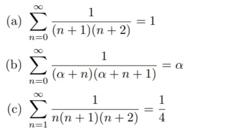Question
4. By using partial fractions, show that 1 (2) (n + 1)(n + 2) n=0 1 (a (b) (x + n)(a + n +
![]()

4. By using partial fractions, show that 1 (2) (n + 1)(n + 2) n=0 1 (a (b) (x + n)(a + n + 1) (c) 1 1 n(n + 1)(n + 2) = 1 = a
Step by Step Solution
3.47 Rating (157 Votes )
There are 3 Steps involved in it
Step: 1

Get Instant Access to Expert-Tailored Solutions
See step-by-step solutions with expert insights and AI powered tools for academic success
Step: 2

Step: 3

Ace Your Homework with AI
Get the answers you need in no time with our AI-driven, step-by-step assistance
Get StartedRecommended Textbook for
Introduction to Real Analysis
Authors: Robert G. Bartle, Donald R. Sherbert
4th edition
471433314, 978-1118135853, 1118135857, 978-1118135860, 1118135865, 978-0471433316
Students also viewed these Mathematics questions
Question
Answered: 1 week ago
Question
Answered: 1 week ago
Question
Answered: 1 week ago
Question
Answered: 1 week ago
Question
Answered: 1 week ago
Question
Answered: 1 week ago
Question
Answered: 1 week ago
Question
Answered: 1 week ago
Question
Answered: 1 week ago
Question
Answered: 1 week ago
Question
Answered: 1 week ago
Question
Answered: 1 week ago
Question
Answered: 1 week ago
Question
Answered: 1 week ago
Question
Answered: 1 week ago
Question
Answered: 1 week ago
Question
Answered: 1 week ago
Question
Answered: 1 week ago
Question
Answered: 1 week ago
Question
Answered: 1 week ago
Question
Answered: 1 week ago
Question
Answered: 1 week ago
View Answer in SolutionInn App



